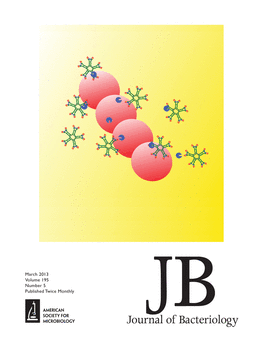
JOURNAL OF BACTERIOLOGY
Scope & Guideline
Connecting researchers to the world of bacteria.
Introduction
Aims and Scopes
- Bacterial Physiology and Metabolism:
Research on the metabolic pathways, nutrient utilization, and physiological adaptations of bacteria under various environmental conditions, including studies on biofilm formation and motility. - Genetic Regulation and Expression:
Exploration of genetic mechanisms governing bacterial behavior, including transcriptional regulation, signal transduction pathways, and the role of small RNAs in gene expression. - Host-Microbe Interactions and Pathogenesis:
Investigations into the mechanisms by which bacteria interact with host organisms, including studies on virulence factors, immune evasion, and the implications for disease. - Microbial Ecology and Evolution:
Studies on the ecological roles of bacteria in various environments, their evolutionary adaptations, and the impact of microbial communities on health and disease. - Antibiotic Resistance and Treatment Strategies:
Research focused on mechanisms of antibiotic resistance, the development of new antimicrobial agents, and strategies to combat resistant bacterial strains.
Trending and Emerging
- CRISPR and Genetic Engineering:
There is a growing trend in the use of CRISPR-based technologies for gene editing and regulation in bacteria, showcasing innovative methods to manipulate bacterial genomes for research and therapeutic purposes. - Microbial Interactions and Quorum Sensing:
Research on microbial interactions, particularly involving quorum sensing and biofilm dynamics, has gained traction, emphasizing the complexity of bacterial communication and community behavior. - Metagenomics and Microbiome Studies:
The exploration of bacterial communities through metagenomic approaches is increasingly popular, reflecting the interest in understanding the roles of microbiomes in health, disease, and environmental processes. - Bacterial Stress Responses and Adaptation:
Emerging studies focus on how bacteria adapt to stressors, including antibiotics and environmental changes, highlighting the importance of stress response mechanisms in bacterial survival. - Synthetic Biology and Engineering Applications:
There is a notable increase in research exploring synthetic biology applications, including the design and engineering of bacterial systems for biotechnological innovations and therapeutic uses.
Declining or Waning
- Traditional Biochemical Characterization:
While biochemical studies remain important, there has been a noticeable decline in papers focusing solely on classical biochemical characterization of bacterial enzymes and pathways, as newer techniques and integrative approaches gain popularity. - Environmental Microbiology of Non-pathogenic Strains:
Research specifically targeting the environmental aspects of non-pathogenic bacteria has seen a decrease, possibly due to a greater focus on pathogenic mechanisms and clinical relevance. - Historical and Review Articles:
The publication of historical reviews or retrospective analyses has diminished, as the journal increasingly prioritizes original research that offers novel insights into current bacterial studies.
Similar Journals
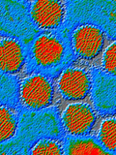
Annual Review of Microbiology
Advancing Microbial Knowledge, One Review at a TimeAnnual Review of Microbiology is a preeminent academic journal published by Annual Reviews, specializing in the dynamic field of microbiology. With a rich history dating back to 1948, this journal has become a vital resource for researchers, professionals, and students alike, providing comprehensive reviews that synthesize the latest advancements and trends in microbiological research. The journal is renowned for its impressive reputation, holding a Q1 ranking in both Medicine (miscellaneous) and Microbiology, and achieving an outstanding Scopus rank of #12 out of 182 in the field, placing it in the 93rd percentile. Although it does not offer open access, the Annual Review of Microbiology remains integral to advancing knowledge and understanding of microbial science, helping to bridge the gap between fundamental research and practical applications in health, industry, and environmental sustainability. Its meticulously curated content serves as a crucial platform for fostering innovation and collaboration among the global research community.
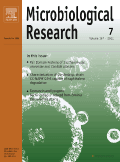
MICROBIOLOGICAL RESEARCH
Leading the Charge in Microbial AdvancementsMICROBIOLOGICAL RESEARCH, published by Elsevier GmbH, serves as a leading platform for advancements in the field of Microbiology, holding an impressive Q1 ranking in its category as of 2023. With an ISSN of 0944-5013 and E-ISSN 1618-0623, this journal has been instrumental in disseminating high-quality research since its inception in 1994 and continues to contribute significantly to the academic landscape through 2024. Positioned within the top 13% of publications in the Immunology and Microbiology category, ranked #24 out of 182 according to Scopus, it attracts the attention of researchers, professionals, and students alike. While the journal is not open access, it offers vital insights and peer-reviewed articles that drive innovation and exploration within microbiological research. Its rigorous selection process underscores the importance of quality and relevance in advancing knowledge in this dynamic field.

JOURNAL OF BASIC MICROBIOLOGY
Connecting Ideas in Microbiology and BiotechnologyJOURNAL OF BASIC MICROBIOLOGY is a premier publication in the field of microbiology, published by WILEY since 1985. With a significant presence in Germany, this journal encompasses a wide spectrum of research topics, focusing on applied microbiology and biotechnology as well as diverse areas within medicine. Holding a commendable Q2 ranking in both its categories for 2023, it plays a crucial role in disseminating innovative findings and methodologies to the community. Researchers will find it to be an essential platform for sharing high-quality work, where it currently stands at rank #47 in the applied microbiology and biotechnology category, representing the 63rd percentile among international journals. The JOURNAL OF BASIC MICROBIOLOGY caters to a growing audience of professionals and students, offering insights essential for advancement in microbiological research and its applications. While it does not currently offer an Open Access option, it remains an influential outlet for academic excellence, continuously contributing to the development of the field through its rigorous peer-reviewed articles.
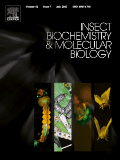
INSECT BIOCHEMISTRY AND MOLECULAR BIOLOGY
Illuminating the Molecular Mechanisms of InsectsINSECT BIOCHEMISTRY AND MOLECULAR BIOLOGY, published by Pergamon-Elsevier Science Ltd, stands at the forefront of interdisciplinary research focusing on the biochemical and molecular processes in insects. This esteemed journal, with an ISSN of 0965-1748 and E-ISSN of 1879-0240, serves as a vital resource for scientists and researchers interested in the intricacies of insect physiology and genetics. With a significant presence in the academic community, it holds impressive rankings, including Q2 in Biochemistry and Q1 in Insect Science according to the latest quartiles, reflecting its critical role in advancing knowledge in these fields. The journal's convergence of content from 1992 to 2024 illustrates its commitment to fostering long-term scholarly discourse. Researchers will appreciate its impact within the Agricultural and Biological Sciences and its contributions to understanding the molecular biology of insects. Although not an open-access journal, it provides complementary insights into the biochemistry and genetics of insects, making it indispensable for anyone keen on pushing the boundaries of entomological science.
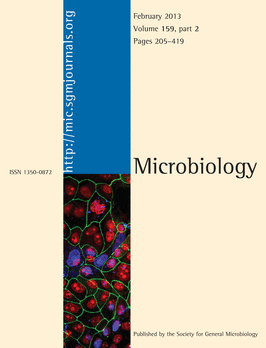
MICROBIOLOGY-SGM
Championing significant findings in microbiological sciences.MICROBIOLOGY-SGM, published by the esteemed MICROBIOLOGY SOC in the United Kingdom, is a pioneering journal dedicated to advancing the field of microbiology. With its ISSN 1350-0872 and E-ISSN 1465-2080, the journal serves as a vital platform for researchers, professionals, and students to disseminate significant findings and engage in the latest developments in microbiology. Since its inception in 1994, MICROBIOLOGY-SGM has upheld rigorous academic standards, demonstrated by its position in the Q2 quartile of the 2023 Scopus category for Microbiology, ranking #108 out of 182. While traditionally not an open-access journal, it offers a rich selection of articles that address a variety of topics within the microbiological sciences. As we approach 2024, the journal continues to foster collaboration and knowledge exchange, making it an indispensable resource for those at the forefront of microbiological research.

Frontiers in Microbiology
Unlocking the Secrets of Microbial LifeFrontiers in Microbiology is a leading open-access journal published by Frontiers Media SA, available since 2010, and based in Switzerland. As a prominent platform for innovative research, it specializes in microbiology and medical microbiology, marked by its impressive Q1 classification in the respective fields, reflecting its significant impact and relevance in advancing microbial sciences. With a Scopus ranking of 49th in Microbiology and 41st in Medical Microbiology, this journal is positioned among the top-tier publications, catering to a diverse audience of researchers, professionals, and students. The journal aims to disseminate groundbreaking findings and foster discussions that drive the field forward, ensuring a comprehensive coverage of microbiological studies, from basic research to applications in healthcare and beyond. Enjoy unrestricted access to cutting-edge articles that contribute to both theoretical and applied aspects of microbiology, enriching the scientific community's knowledge base.

mLife
Connecting researchers in the vibrant realm of microbial sciences.Welcome to mLife, an emerging journal at the forefront of microbiological research published by the esteemed WILEY in China. With its ISSN 2097-1699 and E-ISSN 2770-100X, mLife serves as a vital platform for scholars and practitioners aiming to advance their understanding of microbial sciences. With an impressive Q2 ranking in the Microbiology category and a Scopus rank of 143 out of 182, mLife is quickly establishing itself as a valuable source of cutting-edge research. The journal, covering a range of innovative topics from immunology to environmental microbiology, provides an engaging venue for disseminating high-quality research findings aimed at addressing real-world challenges. Authors and readers alike benefit from its accessibility features that encourage scholarly collaboration and information sharing. As we converge on the rich microbial landscapes from 2022 to 2024, mLife is committed to fostering a community dedicated to rigorous research and impactful discoveries.

PLASMID
Where molecular biology meets scholarly excellence.PLASMID is a prestigious academic journal published by Academic Press Inc Elsevier Science that focuses on the dynamic field of molecular biology, particularly in the study of plasmids and their roles in gene function and expression. Since its inception in 1977, the journal has built a robust reputation, currently holding a Q3 category ranking in Molecular Biology and positioning itself within the 34th percentile based on Scopus metrics, making it a valuable resource for researchers and professionals alike. With an ISSN of 0147-619X and E-ISSN 1095-9890, PLASMID offers a wealth of articles that delve into cutting-edge research, facilitating knowledge-sharing and inspiring innovations in the field. Although it does not operate under an open-access model, the journal remains committed to advancing scholarly communication and maintaining high standards of academic rigor. Researchers and students engaged in biochemistry, genetics, and molecular biology will find PLASMID to be an essential platform for disseminating their findings and exploring novel ideas.
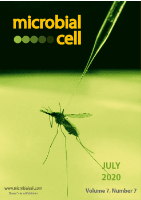
Microbial Cell
Connecting researchers to cutting-edge microbial insights.Microbial Cell is a distinguished open-access journal published by SHARED SCIENCE PUBLISHERS OG, focusing on the dynamic fields of microbiology, biochemistry, and molecular biology. Since its establishment in 2014, Microbial Cell has been at the forefront of disseminating cutting-edge research essential for advancing our understanding of microbial functions and interactions. With a commendable impact factor and ranking in the top quartiles (Q1 and Q2) across several categories, including Applied Microbiology and Biotechnology and Parasitology, this journal serves as an invaluable resource for researchers, professionals, and students alike. It features a comprehensive scope that encompasses the latest findings in genetics, cell biology, and virology, facilitating the academic community's access to high-quality peer-reviewed work. Microbial Cell not only contributes to advancing microbial sciences but also fosters an inclusive platform for knowledge sharing and collaboration in the scientific community.

TRENDS IN MICROBIOLOGY
Uncovering Trends that Transform Microbial UnderstandingTRENDS IN MICROBIOLOGY is a premier academic journal published by CELL PRESS, renowned for its high-impact research contributions in the fields of microbiology, infectious diseases, medical microbiology, and virology. With an impressive impact factor and a notable Scopus ranking—placing it in the top tiers of its categories, including a remarkable Q1 status in multiple disciplines—this journal is essential for researchers, professionals, and students aiming to stay at the forefront of innovative microbial research and ongoing advancements in pathogen biology. Since its inception in 1993, TRENDS IN MICROBIOLOGY has provided a platform for thought-provoking reviews and critical insights, fostering discussions that shape the future of the microbiological sciences. Based in the United Kingdom, TRENDS IN MICROBIOLOGY continues to lead the way in disseminating vital knowledge within the global scientific community.